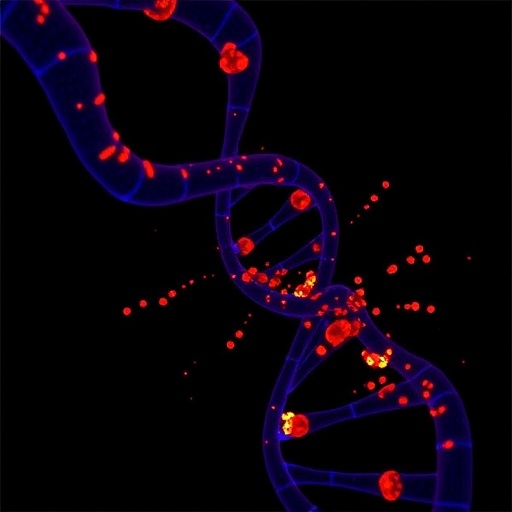In the realm of oncology, the intricate relationship between genetic mutations and cancer progression continues to unveil groundbreaking insights. A recent correspondence penned by Peker delves into a critical area of research, focusing specifically on deficient DNA mismatch repair mechanisms and the expression of Nectin-4 within upper tract urothelial carcinoma (UTUC). As scientific inquiry relentlessly pushes the envelope of knowledge, this study contributes vital data that may illuminate the path toward innovative therapeutic strategies in cancer treatment.
UTUC presents a unique challenge in the landscape of urological malignancies, characterized by its development in the renal pelvis and the ureter. Traditionally, the mechanisms driving this cancer have eluded comprehensive understanding, but recent advances in genetic research are beginning to offer clarity. DNA mismatch repair (MMR) proteins play a pivotal role in maintaining genomic integrity by correcting erroneous insertions, deletions, and mismatches that occur during DNA replication. When these repair mechanisms falter, the consequences can be dire, leading to increased mutation rates and subsequent tumorigenesis.
The study by Peker draws attention to the correlation between deficient MMR and the upregulation of Nectin-4, a cell adhesion molecule with significant implications in cancer biology. Nectin-4 has garnered interest due to its role in promoting tumor growth and metastasis. By examining the expression of Nectin-4 in UTUC cases harboring defective MMR, researchers hope to elucidate the potential oncogenic pathways driven by these molecular alterations.
Prior studies have established a firm foundation for understanding the implications of MMR deficiency in various cancers, notably colorectal and endometrial cancers, where the relationship between MMR status and tumor aggressiveness has been well-documented. In this correspondence, Peker extends this discourse into the realm of UTUC, proposing that similar molecular dynamics may be at play. The examination of Nectin-4 expression in this context may yield critical insights into the aggressive nature of UTUC, further establishing its link to poor patient prognosis.
The clinical implications of the findings bear considerable weight. Identifying patients with MMR deficiency could enable oncologists to tailor treatment strategies more effectively. For instance, individuals exhibiting these genetic vulnerabilities might benefit from immunotherapies or targeted therapies that leverage their unique tumor biology. Hence, this research not only adds depth to the understanding of UTUC but also paves the way for personalized medicine approaches in oncology.
Moreover, the linkage between Nectin-4 and MMR deficiency sheds light on potential biomarkers for disease progression and therapeutic outcomes. If Nectin-4 expression can be reliably quantified in patients with UTUC, it might serve as a prognostic indicator, helping to stratify patients based on their likelihood of aggressive disease. This is particularly crucial in a clinical setting where accurate prognostication can inform treatment decisions and, ultimately, improve patient survival rates.
In addition to characterizing the molecular landscape of UTUC, Peker’s correspondence emphasizes the importance of interdisciplinary collaboration in cancer research. Geneticists, oncologists, and molecular biologists must work in tandem to translate findings from the lab into the clinic effectively. The integration of genetic profiling into routine clinical practice remains a challenge, yet it is clear that such efforts could revolutionize cancer care.
Furthermore, the research highlights the necessity for continued exploration into other markers of tumor behavior in UTUC. While Nectin-4 presents a compelling area of focus, it is merely one piece of a much larger puzzle. Investigating additional molecular alterations associated with MMR deficiency could lead to the discovery of novel therapeutic targets, which have the potential to enhance treatment efficacy substantially.
This correspondence is not only a testament to the advances in understanding the biology of UTUC but also a clarion call for more extensive research in this domain. As clinicians and researchers strive to unravel the complexities of cancer genetics, the findings presented by Peker serve as a reminder of the multifaceted nature of cancer and the need for ongoing investigation.
Furthermore, the potential for Nectin-4 to serve as a therapeutic target highlighted within the correspondence could lead to the development of novel immunotherapeutic strategies. As the landscape of cancer treatment evolves, the identification of molecules that are both involved in pathology and can be adopted for targeted therapy is increasingly becoming central to research efforts.
Finally, as the study underscores the interplay between genetic mutations and cancer progression, it emphasizes the critical role of molecular diagnostics in modern oncology. The ability to assess a tumor’s genetic makeup allows for more precise treatment plans, heralding a new era in which precision medicine may improve outcomes for patients diagnosed with potentially lethal diseases like UTUC.
Ultimately, Peker’s correspondence opens the door to a myriad of research opportunities focused on understanding the underpinnings of UTUC and its variants. As we stand on the brink of what could be transformative advancements in cancer therapy, the collaboration among researchers, clinicians, and patients will be paramount in making strides toward eradicating cancer through tailored medical interventions.
By fostering a dialogue on the importance of MMR deficiency and Nectin-4 expression in UTUC, we can catalyze a movement towards innovations that may ultimately save countless lives. The journey towards unraveling the complexities of cancer is ongoing, and each new piece of knowledge brings us closer to effective treatments that address the unique genetic landscapes of individual patients.
Subject of Research: Deficient DNA mismatch repair and Nectin-4 expression in upper tract urothelial carcinoma (UTUC).
Article Title: Correspondence on “Deficient DNA mismatch repair and Nectin-4 expression in upper tract urothelial carcinoma (UTUC)”
Article References:
Peker, P. Correspondence on “Deficient DNA mismatch repair and Nectin-4 expression in upper tract urothelial carcinoma (UTUC)”.
J Cancer Res Clin Oncol 151, 316 (2025). https://doi.org/10.1007/s00432-025-06363-y
Image Credits: AI Generated
DOI: https://doi.org/10.1007/s00432-025-06363-y
Keywords: UTUC, DNA mismatch repair, Nectin-4, cancer progression, molecular biomarkers, personalized medicine, oncogenes, immunotherapy.




